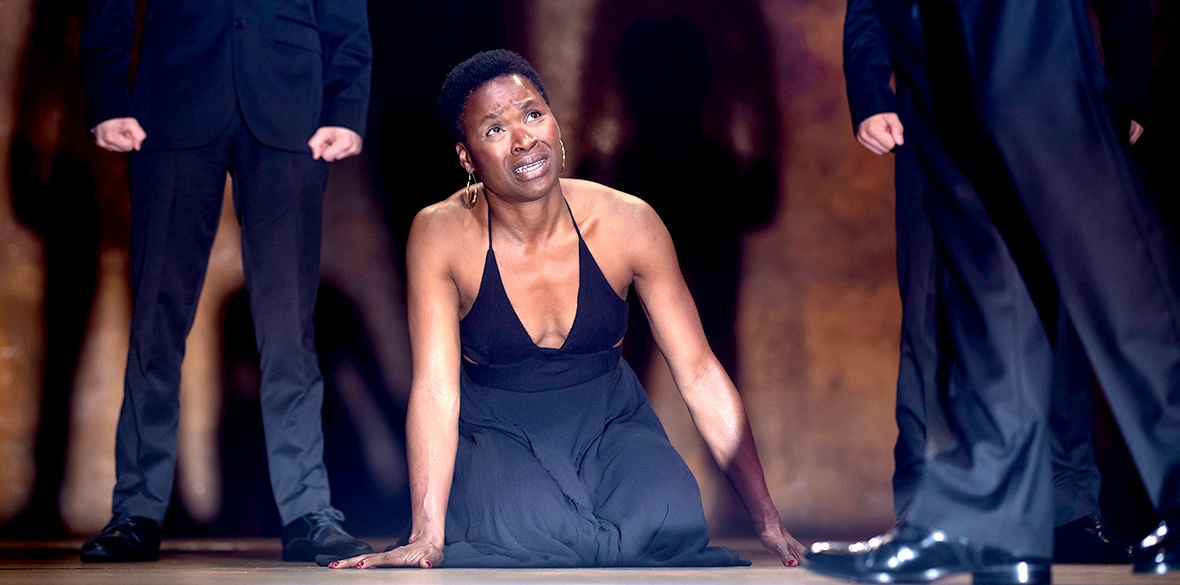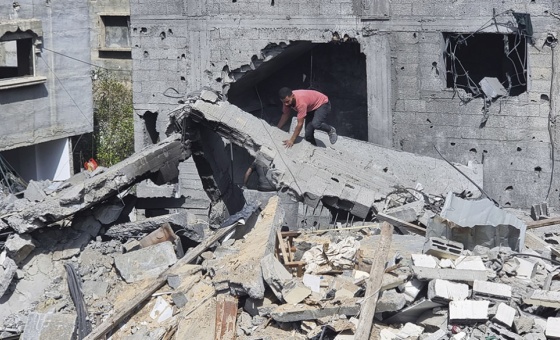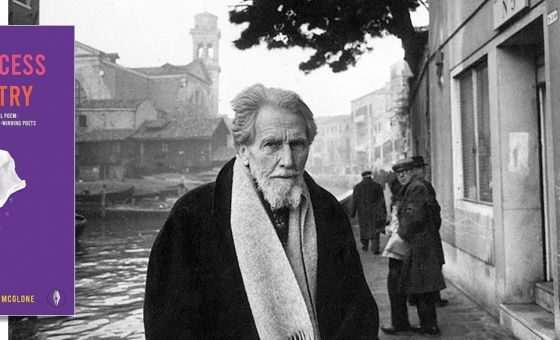This is the last article you can read this month
You can read more article this month
You can read more articles this month
Sorry your limit is up for this month
Reset on:
Please help support the Morning Star by subscribing here
EURIPEDES Medea was given a workover in Scots by Liz Lockhead 20 years ago and she serves it up again as a feminist classic that both affirms and steps beyond contemporary values.
It is revived with a perfect cast and classic simplicity by Michael Boyd and the National Theatre of Scotland amid the neo-Gothic oak, gold and blue of the main hall of the Hub.
The Greeks all speak with unrepentant Scots accents — a woman is a “quine,” a child is a “bairn” — in a language that is both tribal and profoundly modern.
It is within this self-congratulatory hypocritical patriarchy that Adura Onashile’s Medea finds herself abandoned.
Cast aside by Robert Jack’s ambitious and business-like Jason, she embraces the solidarity of a smouldering sisterly chorus, and then appalls them with her revenge.
Such is the sheer clarity of the exposition that it transcends race and gender and stakes out both the identity and limitations of feminism in contemporary Scottish culture and this is an empowering thing to do for both men and women.
As a man I could identify with Onashile’s isolation as a parent abroad, and it was a raw and revelatory pleasure to follow the dawning and execution of her dreadful revenge.
Classics rely on reported action and Adam Robertson, the servant who witnesses the horror excelled as her instrument and foil, from practical and manly to devastated by horror.
James Thieree’s Room is an extravagant collation of quotations from the post-war European avant-garde, but this time it is history repeated as farce.
The concept recalls Tadeusz Kantor’s “poor room of the imagination,” the concept that defined his late plays.
The rhythm of encounters that escalate rapidly from formality to erotic free-for-all echo Ionesco, as does the alternating spectacle of a stage that is one minute empty, and the next crowded and full.
The circus gang that turns on the hapless maestro, the way the show gropes unsuccessfully for a story in a non-stop narrative pratfall, are from Pirandello.
But for Thieree such erudite allusions are merely the excuse to exercise his own brand of slapstick and mime, and he doesn’t look beyond the opportunity to indulge himself.
The result is a long-drawn-out evening of gratuitous theatrical experiment the like of which is pretty much absent in British theatre.
This is a tour de force for a writer/director/performer who is highly literate in the language of the avant-garde.
There is even a touch of Malevich in his climactic dance with a gigantic white square. And true to the European tradition of irritating the bourgeoisie, it leaves it audience baffled and frustrated.
For me, however, and for the eight-year-old sitting behind me, it was an exuberant masterclass, sweet and gratuitous as a giant meringue.
In The Book Of Life Kiki Katese has created a deeply moving and historically important work of didactic theatre.
Having lost half her family to the 1994 Rwandan genocide she created a social project, gathering the accounts of survivors and perpetrators into a book. This performance alludes to that project and guides us through its moral dilemmas.
It is an exceptional feat of imagination and integrity to bring a light touch and a sure moral compass to such events and facts.
The warmth and simplicity of the show points again and again to the impossible complexity that travel in the wake of such a trauma.
“I want to speak but I don’t know what to say,” she says. “I have only shame.” Living with what happened is more complex than the truth.” Why, you ask? Because “the truth can kill you.”
But to be gentle, and clear and truthful is the essence of the show and everything is made lucid. The lyrics of the beautiful singing of her eight-strong choir are translated on the screen, and the gently illustrative magic of shadow theatre accompanies the exposition.
At a time when Rwanda is a byword for Tory callousness, it is a welcome reminder to witness the humanity and political clarity of a great Rwandan artist and activist.
But even among these great shows, the pick of the bunch is one that I walked into by accident — Tinderbox Orchestra at the Old Royal High School.
For a community orchestra to take over the very room that was once to have been the debating chamber of the Scottish Parliament is already an event supercharged with political and social meaning, but the sheer musicianship, the exuberance and the attitude of this group makes of that contentious room a catalyst for the production of hope and significant art.
Tinderbox Orchestra offer young composers from many fields the chance to try out their first compositions and they seek out collaborators not just in the city, but in the world.
One song, Tribes, is rapped by the composer Thomas Murray who introduces it, embodies it and politicises it from within a stunning solidarity of rhythm and colour.
Another, More (the Bosnian word for sea) comes from workshops with the Balkan Music Camps and with a sure touch (akin to the Book of Life) passes on the capacity to live beyond trauma in the thrilling shorthand of rhythm and melody learned from their Bosnian counterparts.
They play, they dance, they sing and in proper ceilidh style end with a cracking fiddle battle, though this time between guitar and bass.
That every concert is different and invites a new collaboration — instant arrangements under the direction of the inspired artistic director, Jack Nissan — means that this is no static show but a process whose values are sure (and shared by everyone in the room) but whose music is infinite and still being found.
If you want to witness just one great artistic event, one heart-warming and mind-opening joyous piece of the future, make it this one.











